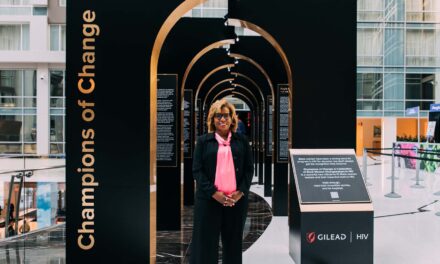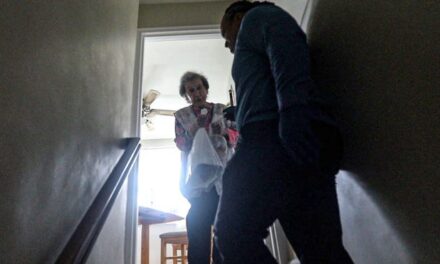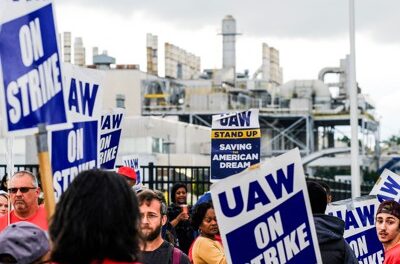
The directors of “Earth Mama” and “A Thousand and One” compare notes on complex portraits of Black motherhood that reject ’90s stereotypes.
“Earth Mama” opens with a fake-out: a young Black woman named Gia (Tia Nomore) happily tickling a cooing newborn. But as the camera pulls away, a more ambivalent reality is exposed. The baby belongs to an older couple visiting the mall portrait studio to take their family photo, while Gia, very much pregnant, wistfully gazes after them.
Appearing early in Savanah Leaf’s new big-screen drama, “Earth Mama,” Gia’s longing and loneliness result from her struggle to regain custody of her two older kids, now in foster care, and to prevent her next child from suffering their fate. Leaf poignantly explores the impediments facing such mothers — limited and highly supervised visits with their children, low-paying jobs, bigoted social workers and all-consuming parenting classes — and their determination to reunite with their children.
The result is a complex portrait of Black motherhood and an unflinching condemnation of child protective services because of its disproportionate punitive impact on Black families. It’s a system that scholar Dorothy Roberts describes as “family policing.” According to a recent study, 53 percent of all Black youngsters will experience a child-welfare investigation before they reach 18, almost twice that of their white counterparts.
In New York City, these racial disparities are even worse. A racial equity audit conducted in 2020 by the Administration for Children’s Services found that Black families are seven times as likely as white families to be accused of child maltreatment and 13 times as likely to have their children removed.
The filmmaker A.V. Rockwell does not cite these staggering statistics in her “A Thousand and One” (now available on Amazon Prime). Instead, she reveals, in breathtaking fashion, the devastating impact that the New York child welfare system had on Inez (Teyana Taylor) and her partner, Lucky (Will Catlett), through their desperate act to interrupt this cycle for their son, Terry.
While both films premiered at Sundance this year, with “A Thousand and One” winning its Grand Jury Prize, they have two more things in common: they empathize with Black mothers separated from their children without overly romanticizing their own protagonists. And unlike the much older and similarly themed “Losing Isaiah,” (1995) starring Halle Berry, they do so without pathologizing their choices, bad or good, and by arguing that the most viable safety nets for Black children are the communities from which they come.
In a video interview with Leaf, a former Olympic volleyball player born in London and raised in the Bay Area, and Rockwell, who first gained attention for directing Alicia Keys’s musical short “The Gospel” and grew up in Queens, the two young Black women filmmakers shared their mutual appreciation for each other’s work, discussed how they rejected older movie stereotypes about Black mothers without overcorrecting, and explained why in their feature debuts they felt that first-time actors were the perfect leads for their imperfect characters. These are edited excerpts from the conversation.
Do you know each other?
A.V. ROCKWELL We have these parallel paths. Savanah was at the “A Thousand and One” premiere at Sundance, which was exciting. I didn’t have the privilege to see her film there, but I’ve seen it since, and it’s quite stunning, my lady.
SAVANAH LEAF Thank you, thank you. I’ve also seen A.V.’s work since we’ve both been doing music videos and commercials for years. I didn’t know her through the whole journey of this film, but I did see the big buildup to this moment and its progression over the years throughout all of her work. I’m proud of and excited for A.V.
The settings seem like love letters to the different places you grew up, New York City and Northern California.
ROCKWELL Before I knew what the story would be, I knew I wanted to do my farewell-to-New York story, something that acknowledged what it meant to come of age in New York as a young woman. Inez is not young young, but being a young mother forces you to grow up. And then it is also about New York as a rough and tough city similar to Inez’s roughness and toughness, coming of age as a more palatable and accessible city. So I was working through the heartbreak of seeing how gentrification was changing areas like Harlem that were predominantly Black. New York is the villain in many ways.
LEAF This film is very nostalgic for me. I recall what it was like to be in the Bay Area in the mid-2000s, and there was a real sense of community then. Gia works at Photo Magic, which was based on a real portrait studio where everybody went to take these happy family photos in front of escapist backdrops. It was always so beautiful but also so painful because everyone was showing their version of a happy family.
The Bay is also surrounded by the Redwood forest. It’s a place that people in the Bay, including Gia, go to as an escape. I thought a lot about those trees and how strong they are, and how they communicate with one another beneath the ground. Those roots represent her inner life, her connection to a lineage of Black women, and the trauma she inherited and, at times, wants to break away from. I find beauty, power and strength in that lineage.
Let’s talk about Inez and Gia. How did you craft these flawed yet layered characters?
ROCKWELL The lack of perfection was important to me. I think a lot of times, because we’ve been represented so stereotypically in film and TV, we can overcorrect. This movie starts in the early ’90s, and when I think of so many Black classics that came out at that time that also represented the urban experience, you just really didn’t get the full breadth of who we were as women, or often the complicated sides of us were given no context. So I wanted to give back to the women of that time. Inez is a character that desperately wants to be loved. I don’t think Black women need to be perfect, to be educated, come from the best background, to be loved. You’re deserving of love anyway.
LEAF I’ve seen many Black women portrayed in films that I don’t resonate with, especially with how they deal with pain and persist. So, through Gia and how she is resilient and handles all the stresses of her life, I wanted to create a film that resonated with me. I understand there’s a whole history of Black mothers in cinema, but I don’t think I was trying to counter that directly. I just wanted to make something as truthful and honest, to me, as possible.
ROCKWELL I think honesty is a great and important word.
Let’s talk about those powerful performances. The rapper Tia Nomore and singer Teyana Taylor are also making their film debuts. How did you know they would be your Gia and Inez, respectively?
LEAF At first, I was thinking about a person that would have to be in every scene, so I was looking for an experienced actor who was perfectly Bay Area and a recent mom to play Gia. But, when we met Tia, she had had a baby a year prior, was still breastfeeding, and knew the physicality of going into labor. So although she had never acted before, she was a performer, and because she was born and raised in Oakland, she knew a lot of the people in the film, which was wild. There was already a sense of community before we even started filming.
ROCKWELL Teyana authentically represented the New York City woman I was looking for. I wrote this character in a very nuanced way, and even from her first reading, I thought she could pick up on the character’s psychology. And because she has a performance background, I saw her bringing her creativity to how she interpreted it. Teyana has her own story to tell, so she could pour into this character in the right way and have compassion for her because, like me, she knew who this woman was in the real world and didn’t look down on her.
Why did you decide to confront the foster care system?
LEAF When researching the foster-care system, you realize how broken it is on every level. How are mothers supposed to attend all the required classes, have a job, sometimes pay the foster family to take care of their children, and make their visitation hours? What does that make children feel like? What does it make parents feel like? And is that good for anybody? I wanted to depict this cycle, which is almost impossible to escape. I’m talking about children in the foster-care system who grow up and have their own children.
ROCKWELL A big part of Inez’s journey is about what it means to be a woman in this community, let alone one that has gone through foster care. She’s there protecting Terry from the same experience she had, but who’s there protecting her? I think what drew me to the foster-care system was seeing how people who spent their childhoods in foster care were impacted as adults when the system failed them. So much of this film is about the meaning of home and the power of family. All those things are what people in foster care want more than anything. And so, this is a story about our community and displacement and the desperate longing for a sense of home.
Your characters respond to that threat of people by making controversial choices. Without giving too much away, how do you want the audience to react to their difficult decisions?
LEAF The woman that opens my film directly speaks to that when she says, “You can’t walk in my shoes, but you can walk beside me.” What interested me was getting the audience to a point where they feel for this Black mother who does something very real and relatable but is also difficult to watch. It is something people are very quick to judge if they just see it straight off the bat. So, bringing the audience on this journey and allowing them to walk beside her was really important. And hopefully, when that turning point happens, they still see her working hard to be the best mother she can be.
ROCKWELL It’s very difficult not to talk about the end, but Inez’s decision when she embarks on this journey with Terry is the ultimate act of love. She’s trying to give the same love to this child that she wishes somebody gave her when she was his age. If people can understand that, they can understand the heart of what we were trying to get to in the first place, which is this conversation around foster care and the way it can leave people truly broken. In a way, I think it’s beautiful that Inez is desperately trying to break a cycle. She knows the power of love as an action. It is not just a feeling or hope for another human being, but really taking matters into your own hands when you need to give somebody the life you wish you had.




